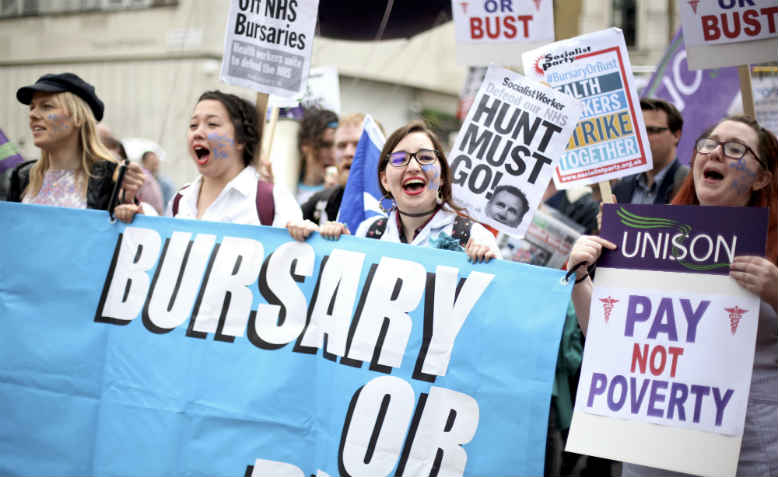 Photo: David Bailey
Photo: David Bailey
The media and unions are welcoming the proposed reform to NHS pay, but David Bailey explains why it’s a bad deal and should be rejected
As a Nurse working in A&E I have witnessed the NHS crisis first hand. The issues that have led us to this point have been discussed ad nauseam, but in short, are the result of deliberate Tory policy to destroy our socialist health care system, replacing it with a US-style private insurance-led operation.
The ‘Framework agreement on the proposed reform of Agenda for Change (AfC)’ was launched last week, with the consent of 13 Unions and Professional Bodies, representing the 1.2 million staff working in the NHS. This states in its introduction that one of its key objectives is to ‘support the attraction and recruitment of staff’.
The recruitment and retention of NHS staff has reached a critical point, caused by:
- The loss of NHS Bursaries for staff training as Registered Nurses, Midwives, Radiographers, Paramedics; Occupational, Physio and Speech Therapists at University, and the introduction of fees, now totalling £9,250 p/a with interest being charged at 6.5%. Applications for these courses fell by 23% in 2017, and again by 17% so far this year.
- 33,000 Nurses and Midwives left the NMC register last year; the first year in which those leaving outnumbered those entering these professions.
- There are currently about 40,000 WTE (Whole Time Equivalent) nursing and care support vacancies in England. This means that many clinical areas are working with daily rota gaps; resulting in Nurses trying to give care to 8-15 patients each. This is despite campaigns and a promise for minimum staffing requirements following the North Staffordshire Hospital Inquiry. Nurses become exhausted and ‘burnt out’ very quickly as a result.
- As a profession Nurses specialise, following qualification, and require ongoing education and training in order to ensure we give patients the best, most up-to-date treatment and care. The NHS Post Graduate Education budget was cut by 50% in 2016, to pay for the training of Nurse Apprenticeships and Associate Nurses. These new ‘nurse’ roles are to be used to replace Registered Nurses with cheaper, less qualified alternatives. Many Nurses are now required to do further training in their own time, and at their own expense.
- Locally, vacancies are as high as 14%, which has resulted in cancelled elective surgery and the delay and rationing of Cancer care.
- The value of our salary has fallen by 14-16% since the pay cap was imposed in 2010, which has meant staff cannot afford housing in many areas of England, especially the South East.
The proposed reform of NHS pay has also been welcomed by the mainstream media, the Labour Party, the Shadow Health Secretary, Jonathan Ashworth, and the heads of the RCN and Unions, Unite and Unison. I do not believe they have properly interrogated the proposal, but have accepted what they have been told.

Headlines like this do nothing but prepare the complaints of greed, when we reject this divisive, insulting and negative pay offer.
On the surface, the proposal may look attractive, with AfC staff receiving between 6.5% and 29% over the next 3 years. However, read the document more thoroughly and you will discover there are few, if any, winners:
- Sickness absence pay will be reduced. It will no longer include average enhancements to pay, as it does currently. This is to ‘improve the attendance of staff’.
- Annual incremental pay rises will go. Increments will be reduced in most staff ‘Bands’ to 2-3. These will no longer be annual, but determined by Line Managers, and will have locally determined ‘performance’ improvement targets. A framework will also be introduced to ensure staff are ‘upskilled’; this will become part of the requirements for future pay progression. Staff who are perceived to have failed to achieve the skills/standards required by their manager can be held at that point, and not progress.
- Those staff on Bands 2-8 will receive only 3% this year, with 1.7% 2019/20 and 1.67% 2020/2. This is well below inflation of 3%, which is predicted by the OFS to rise to 9.5% in the next 3 years; with average Council Tax rising 6% and energy prices by 12%. This offer remains a pay cut.
- Staff at the top of their Band Grade will receive a further 1.1% in 2019/20 lump sum, totalling an average of £1300 after tax.
- This new proposal does not offer what it promises. Most NHS Nurses are paid at Band 5, so I will use that as the example. Currently, a newly qualified RN will start on £22,128, rising, with increments to £24,907 after 3 years. Under the new pay offer they will now start on £26,970, a rise of 7.6%, not the 21.8% claimed. A Band 5, after a minimum of 8 years experience is currently on £28,746 will be paid £30,615 by 2020, a rise of just 6.5%.
As with the Junior Doctors contract imposed on them in 2016, this pay offer is divisive and unfair. In collective bargaining for previous pay settlements, Unions and Professional Bodies representing staff have ensured any offer was equal and across the board. In accepting different pay rises for different grades/bands of staff they have betrayed and failed us.
As NHS staff we must remain united and reject this pay settlement. We must ensure that any offer is equitable for all. The retention and recruitment crisis means that we are in the strongest negotiating position we have ever been in. We must send a clear message to our leaders that what has been ‘negotiated’ is unacceptable. That a slight to one is a slight to all.
When we receive our ballot papers in April our response must be a clear and vocal NO!

